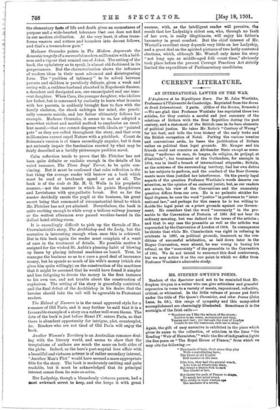CURRENT LITERATURE.
AN INTERNATIONAL LAWYER ON THE WAR.
L'Angleterre at lea Republiques Boers. Par M. John Westlake, Professeur 1 1'Universit6 de Cambridge. Reprinted from the Revue de Droit International. 2 parts. (Office of the Review, Brussels.) —We are glad that Professor Westlake has reprinted these two articles, for they contain a careful and just summary of the relations of Britain with the Boer Republics during the past century, and a statement of the British case in its bare elements of political justice. He takes Mr. Reitz's "Century of Wrong" for his text, and tells the true history of the early treks and the British occupation of Natal. Putting the various treaties and conventions aside, he bases the justification of Britain rather on political than legal grounds. Mr. Kruger and his friends could not conceive an Afrikander State except as some- thing " uniform° de race, de league, de religion, de prejug6, et d'habitude"; his treatment of the Outlanders, for example in 1894, was in itself a breach of international etiquette ; Britain, as the mistress of the surrounding territory, had her own duties to her subjects to perform, and the conduct of the Boer Govern- ments more than justified her interference. On the purely legal aspects of the question Professor Westlake's words deserve our attention, as the opinion of an eminent jurist; but, as our readers are aware, his view of the Conventions and the suzerainty question differs from our own. He is no pedantic stickler for legal dogmas, he uses the word " justice " in preference to "inter- national law," and perhaps for this reason he is too willing to decide the legal point on a priori grounds against our Govern- ment. He considers that the word " suzerainty " in the pre- amble to the Convention of Pretoria of 1881 did not bear its ordinary meaning, but was defined in the terms of the articles ; and that in any case the preamble as well as the articles was superseded by the Convention of London of 1884. In consequence he thinks that while Mr. Chamberlain was right in refusing to arbitrate in 1897, on political grounds, inasmuch as the con- ditions of successful arbitration, as laid down later in the Hague Convention, were absent, he was wrong in basing his refusal on the " suzerainty " of the preamble to the Convention of 1881. We do not intend to resurrect this dead controversy, but we may notice it as the one point in which we differ from Professor Westlake's admirable study.






































 Previous page
Previous page